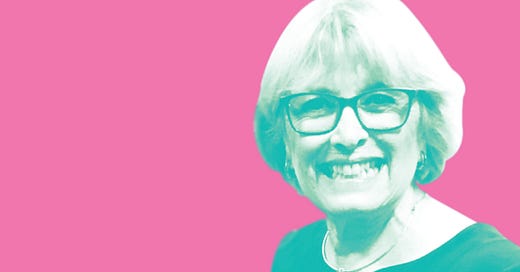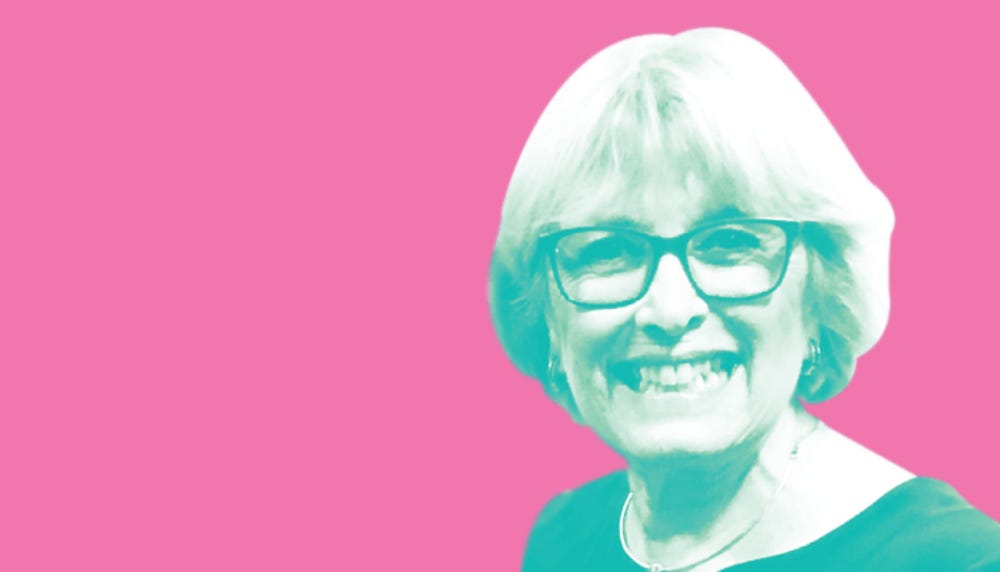Pass It On is a bi-weekly newsletter bringing the tech and non-profit sectors closer together through knowledge sharing, written and edited by Lauren Crichton.
Welcome to all the recent subscribers! If you're new here, join us bi-weekly by hitting the button below:
—
Hello!
Q&A week is back, and I couldn’t be more excited to introduce you to the multi-talented and mighty-determined Judith Potts.
Judith is a former actor, coach, and Telegraph columnist who now dedicates her working days to Esme’s Umbrella, the campaign group she founded in 2015 to raise awareness of Charles Bonnet Syndrome (CBS). A little-known and yet highly devastating condition, CBS can develop when someone of any age has lost over 60% of sight. It causes vivid and silent visual hallucinations that range from disturbing to terrifying.
Over the past six years, Judith has worked tirelessly to raise awareness for the condition—both amongst the general public and medical community. And as you’ll see from the answers below, Judith’s personal story has inspired her to achieve an enormous amount in a very short time.
🌟 Shining the spotlight with Judith Potts
Tell us more about Charles Bonnet Syndrome and why you decided to launch Esme’s Umbrella.
Charles Bonnet Syndrome (CBS) is caused entirely by loss of sight. With full sight, messages constantly run from the retina in the eye to the brain's visual cortex but, as sight diminishes, these messages slow down or stop entirely. However, for some reason that we do not yet understand, the brain does not stop. Instead, it fires up and creates its own images. What someone with CBS sees depends on which part of the brain is firing at that moment. Professor Dominic Ffytche—the sole globally acknowledged expert in CBS—estimates that there are more than 1 million cases of CBS in the UK alone.
I launched the campaign group Esme's Umbrella for two interconnected reasons. First, too few healthcare professionals know about CBS. Second, and consequently, far too many people who develop the condition mistake their hallucinations for a mental health condition and don't confide in their ophthalmologists or optometrists.
I discovered both of these problems through lived experience. My mother Esme had probably lived with CBS for months before she told me about her “visions” of faceless people sitting on her sofa, the Edwardian street-child, and the grotesque, gargoyle-like creature. Despite her knack for the daily cryptic crossword, the word dementia hung in the air. It wasn't until I read a short piece in a newspaper about a hallucinatory condition caused by sight loss and confirmed by Prof. Ffytche that I was able to start piecing things together. Even then, help was hard to come by: Esme's ophthalmologist refused to discuss CBS, and neither her GP nor her optometrist had heard of the condition.
Until Prof. Ffytche began his ground-breaking research in the 1990s, the door on CBS had been firmly shut. But, thankfully, his continued work has debunked many longstanding myths about the condition. For example, we now know that children are as likely to develop CBS as are adults and that the condition can remain with the person for life.
In addition to this vital research, I knew we still needed to raise more awareness. We needed a way to persuade ophthalmologists, optometrists, and orthoptists to warn people with diminishing sight about CBS. When someone can recognise the first hallucination for what it is, the outcome is considerably better: forewarned is forearmed.
I launched Esme's Umbrella in November 2015 at the UK House of Commons, with Dr. Ffytche as my medical adviser.
Am I right in assuming that the campaign is called Esme's Umbrella in memory of your mother?
Yes. My mother Esme developed CBS after being diagnosed with Glaucoma in her eighties, and it destroyed the peace of her final years. Esme spent her life looking after others, having first trained as a children's nurse and later working as a welfare officer to other nurses. It seemed only fitting to name the campaign after her.
The umbrella is there to shelter the whole CBS community.
The Royal National Institute of Blind People (RNIB) has reported a 50% increase in calls about CBS during the pandemic. What's behind the spike?
We have always suspected that isolation, stress or anxiety, and fever can exacerbate CBS episodes. However, recent research by Professor Mariya Moosajee has now proven it. Her findings cite lack of exercise and brain stimulation and constantly hearing negative news stories as additional triggers.
Coronation Street, the longest-running soap opera on British TV, recently included CBS in a major storyline thanks to your work. What impact has it had?
The Coronation Street production team approached me and asked if I would help with a CBS storyline. (I think someone in the team may have had a relative who developed the condition.) Soap operas are the social voice and bring to the public attention all sorts of diseases and conditions. Coronation Street has an audience of between 7 and 10 million: I would have had to work 24 hours a day for the rest of my life to achieve the same awareness level as was produced by a short storyline in their show. Following the episode in which they revealed the CBS diagnosis, my Helpline took over 1800 calls, and my inbox and Facebook page were equally overwhelmed. That says it all.
The Coronation Street storyline is an exceptional achievement. What are some of the more usual ways Esme's Umbrella tries to raise awareness of CBS?
I'm always looking for opportunities to write for journals (scientific or otherwise) and spend a lot of time contacting vision support charities to explain what CBS is and why they should provide support. I sometimes even end up calling GPs on behalf of these charities' patients to explain CBS! The same goes for nurses, eye clinic liaison officers, and rehabilitation officers. I also lobby the Royal Societies of Ophthalmologists, Optometrists, and GPs for more CBS awareness among their members. I have even persuaded the World Health Organisation to include CBS in its taxonomy of diseases and conditions, which now means that the UK's National Health Service must spearhead research and create a pathway for diagnosis, treatment, and support.
You run Esme's Umbrella single-handedly. How do you juggle it all?!
I seek out partnerships and support wherever I can. For example, the RNIB's Eye Health Team now answers my Helpline, and last year, I asked the UK’s local sight loss charities to host Esme's Friends, our telephone/online chat and support groups.
Asking for help doesn't mean shirking responsibility. If someone calls the Helpline and wants to speak to me, the RNIB sends over the contact details, and I try to return the call that same day. I aim to respond to direct emails and Facebook page messages just as promptly. People needing help and support should always come first.
You were a columnist at the Telegraph for almost a decade. You were also involved in the performing arts. How have your skills and experiences from these fields transferred to your current role?
Writing about health—mainly cancer, following my diagnosis of breast cancer—opened the door to the work of many charities. From there, I watched and learned: I saw what worked and what didn't, how people judged press releases, and how vital it was to create the right sort of campaign.
My time in the theatre as an actor and then as a coach to child actors, plus teaching presentation technique, gave me the listening skills that are essential when talking to people who live with CBS. Everyone's CBS experience is different, and I learn something new from each person who chooses to share how CBS affects their life. Adjusting to a person's character and vocal pattern is something an actor does instinctively and can be extremely helpful when building relationships.
How could the tech sector improve the lives of people with CBS and other visual impairment conditions?
We need more innovation and ideas. At least 2.2 billion people globally have some form of visual impairment, 1 billion cases of which could have been prevented or are still to be addressed. And the number of blind and partially-sighted people is set to triple over the coming few decades.
I'm not a technical person, but I did spot an opportunity to adapt the concept behind Be My Eyes—a free app that connects blind and partially-sighted people to volunteers who can assist—to Amazon Alexa. However, it probably wouldn't be viable as you'd need an Alexa in each room for the service to work, which would be prohibitively expensive.
Aira is another startup working to transform the daily lives of blind and partially-sighted people through technology. Esme's Umbrella and the Thomas Pocklington Trust are currently piloting a project with AIRA to see whether its app could help people differentiate between reality and a hallucination. For example, is there a cat/fire/flames in the room or not? However, this solution doesn't solve the problem for people with CBS who don't have camera phones.
In addition to ideas and solutions, we welcome funding. Esme's Umbrella is working with Fight for Sight, the UK's leading eye research charity, to raise vital funds for medical research into CBS. You can support us via our JustGiving page.
Feel free to share any thoughts and ideas with me via esmesumbrella@gmail.com.
Thank you, Judith 🙏
For those of us who are non-disabled, it’s easy to forget that daily life can look/sound/taste/smell/feel very different for many, many people around us. I know you’re a creative bunch: if you can think of any opportunities to enhance the lives of people with CBS or any other conditions, be sure to get in touch with Judith via the email address above or:
Thanks for reading and supporting as always, and see you in two weeks!
Lauren
P.S. I wasn’t sure whether to use the term non-disabled or able-bodied in the paragraph above. This helpful guide on inclusive language from GOV.UK quickly set me on the right path.




